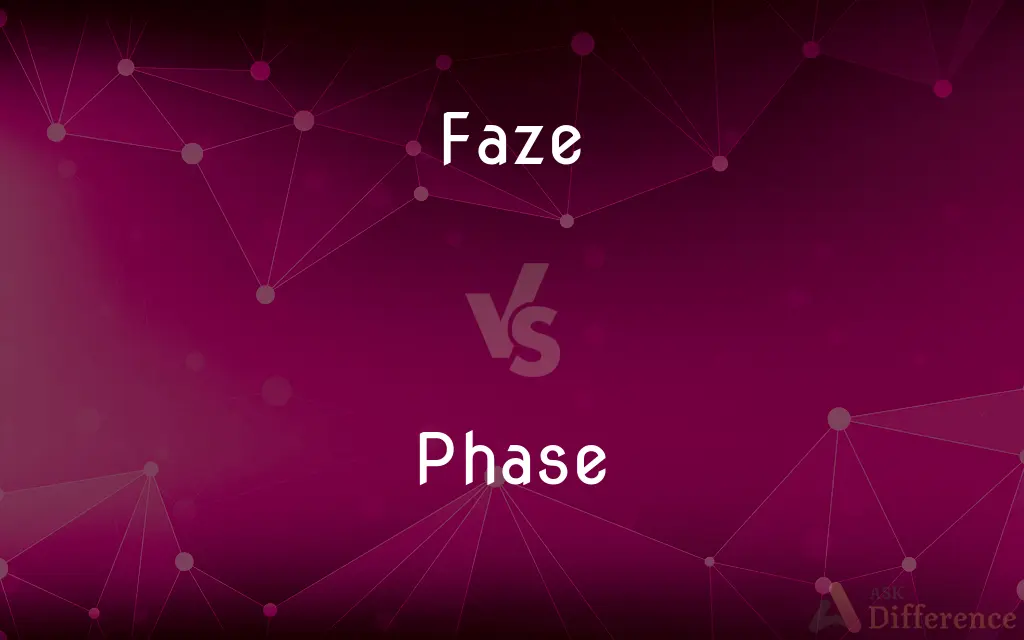Faze vs. Phase — What's the Difference?

Difference Between Faze and Phase
ADVERTISEMENT
Compare with Definitions
Faze
Disturb or disconcert (someone)
She was not fazed by his show of anger
Phase
A distinct period or stage in a series of events or a process of change or development
The final phases of the war
The draw for the qualifying phase of the tournament was held over the weekend
Phase two of the development
Faze
To disrupt the composure of; disconcert.
Phase
Each of the aspects of the moon or a planet, according to the amount of its illumination, especially the new moon, the first quarter, the full moon, and the last quarter.
Faze
To frighten or cause hesitation; to daunt, put off usually used in the negative; to disconcert, to perturb.
Jumping out of an airplane does not faze him, yet he is afraid to ride a roller coaster.
ADVERTISEMENT
Phase
A genetic or seasonal variety of an animal's coloration
The invertebrate residents of the tundra pass the winter in dormant phase
Faze
To cause to become disconcerted or disturbed. A variant form of Feeze.
Phase
A distinct and homogeneous form of matter (i.e. a particular solid, liquid, or gas) separated by its surface from other forms
Solid carbon dioxide passes directly into the gas phase without becoming a liquid
Faze
Disturb the composure of
Phase
The relationship in time between the successive states or cycles of an oscillating or repeating system (such as an alternating electric current or a light or sound wave) and either a fixed reference point or the states or cycles of another system with which it may or may not be in synchrony
There are two output channels, one fixed in phase and the other variable in phase between 0 and 360 degrees
Phase
(in systemic grammar) the relationship between a catenative verb and the verb that follows it, as in she hoped to succeed and I like swimming.
Phase
Carry out (something) in gradual stages
The work is being phased over a number of years
Phase
Adjust the phase of (something), especially so as to synchronize it with something else
About 70% of the reflections were phased by this method
Phase
A distinct stage of development
“The American occupation of Japan fell into three successive phases” (Edwin O. Reischauer).
Phase
A temporary manner, attitude, or pattern of behavior
Just a passing phase.
Phase
An aspect; a part
We must reconsider every phase of the operation.
Phase
One of the cyclically recurring apparent shapes of the visibly illuminated portion of the moon or a planet.
Phase
The relative configuration, measured in angular units such as degrees or radians, of two orbiting bodies that periodically eclipse.
Phase
A particular stage in a periodic process or phenomenon.
Phase
The fraction of a complete cycle elapsed as measured from a specified reference point and often expressed as an angle.
Phase
Any of the forms or states, solid, liquid, gas, or plasma, in which matter can exist, depending on temperature and pressure.
Phase
A discrete homogeneous part of a material system that is mechanically separable from the rest, as is ice from water.
Phase
(Biology) A characteristic form, appearance, or stage of development that occurs in a cycle or that distinguishes some individuals of a group
The white color phase of a weasel.
The swarming phase of locusts.
Phase
To plan or carry out systematically by phases.
Phase
To set or regulate so as to be synchronized.
Phase
To become incorporeal so as to be able to move through a solid object
“He got out of the car without opening the door—just phased through it—and walked up the steps of the church” (Dean Koontz).
Phase
A distinguishable part of a sequence or cycle occurring over time.
Phase
That which is exhibited to the eye; the appearance which anything manifests, especially any one among different and varying appearances of the same object.
Phase
Any appearance or aspect of an object of mental apprehension or view.
The problem has many phases.
Phase
(astronomy) A particular appearance or state in a regularly recurring cycle of changes with respect to quantity of illumination or form, or the absence, of its enlightened disk. Illustrated in Wikipedia's article Lunar phase.
The phases of the moon
Phase
(physics) Any one point or portion in a recurring series of changes, as in the changes of motion of one of the particles constituting a wave or vibration; one portion of a series of such changes, in distinction from a contrasted portion, as the portion on one side of a position of equilibrium, in contrast with that on the opposite side.
Phase
(chemistry) A component in a material system that is distinguished by chemical composition and/or physical state (solid, liquid or gas) and/or crystal structure. It is delineated from an adjoining phase by an abrupt change in one or more of those conditions.
Phase
(zoology) In certain organisms, one of two or more colour variations characteristic of the species, but independent of the ordinary seasonal and sexual differences, and often also of age.
Phase
(rugby union) The period of play between consecutive breakdowns.
Phase
(genetics) A haplotype.
Phase
(math) The arctangent of the quotient formed by dividing the imaginary part of a complex number by the real part.
Phase
(music) A distortion caused by a difference in the speed of propagation for different frequencies
Phase
(electrical engineering) In a polyphase electrical power system, one of the power-carrying conductors, or the alternating current carried by it.
Phase
To begin—if construed with "in"—or to discontinue—if construed with out—(doing) something over a period of time (i.e. in phases).
The use of the obsolete machines was gradually phased out as the new models were phased in.
Phase
Antique form of faze.
Phase
To determine haplotypes in (data) when genotypes are known.
Phase
To pass into or through a solid object.
Phase
(science fiction) To use a phaser.
Phase
(obsolete) Passover
Phase
That which is exhibited to the eye; the appearance which anything manifests, especially any one among different and varying appearances of the same object.
Phase
Any appearance or aspect of an object of mental apprehension or view; as, the problem has many phases.
Phase
A particular appearance or state in a regularly recurring cycle of changes with respect to quantity of illumination or form of enlightened disk; as, the phases of the moon or planets. See Illust. under Moon.
Phase
Any one point or portion in a recurring series of changes, as in the changes of motion of one of the particles constituting a wave or vibration; one portion of a series of such changes, in distinction from a contrasted portion, as the portion on one side of a position of equilibrium, in contrast with that on the opposite side.
Phase
A homogenous, physically distinct portion of matter in a system not homogeneous; as, the three phases, ice, water, and aqueous vapor. A phase may be either a single chemical substance or a mixture, as of gases.
Phase
In certain birds and mammals, one of two or more color variations characteristic of the species, but independent of the ordinary seasonal and sexual differences, and often also of age. Some of the herons which appear in white and colored phases, and certain squirrels which are sometimes uniformly blackish instead of the usual coloration, furnish examples. Color phases occur also in other animals, notably in butterflies.
Phase
The relation at any instant of a periodically varying electric magnitude, as electro-motive force, a current, etc., to its initial value as expressed in factorial parts of the complete cycle. It is usually expressed in angular measure, the cycle beb four right angles, or 360°. Such periodic variations are generally well represented by sine curves; and phase relations are shown by the relative positions of the crests and hollows of such curves. Magnitudes which have the same phase are said to be in phase.
Phase
The relation at any instant of any cyclically varying physical quantity, such as voltage in an A.C. circuit, an electromagnetic wave, a sound wave, or a rotating object, to its initial value as expressed as a fractional part of the complete cycle. It is usually expressed in angular measure, the complete cycle being 360°.
Phase
To disturb the composure of; to disconcert; to nonplus; - an older spelling, now replaced by faze.
Phase
(physical chemistry) a distinct state of matter in a system; matter that is identical in chemical composition and physical state and separated from other material by the phase boundary;
The reaction occurs in the liquid phase of the system
Phase
Any distinct time period in a sequence of events;
We are in a transitional stage in which many former ideas must be revised or rejected
Phase
A particular point in the time of a cycle; measured from some arbitrary zero and expressed as an angle
Phase
(astronomy) the particular appearance of a body's state of illumination (especially one of the recurring shapes of the part of Earth's moon that is illuminated by the sun);
The full phase of the moon
Phase
Arrange in phases or stages;
Phase a withdrawal
Phase
Adjust so as to be in a synchronized condition;
He phased the intake with the output of the machine
Share Your Discovery

Previous Comparison
Boundary vs. Perimeter
Next Comparison
Mark vs. Trace













































